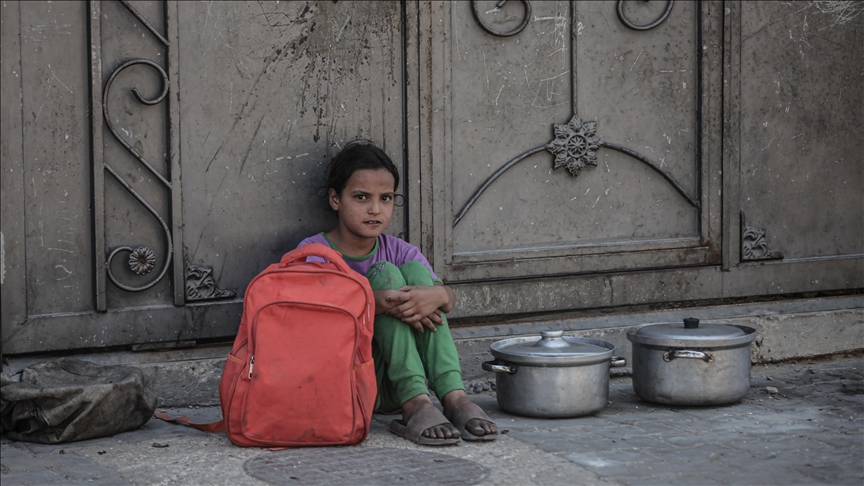Gaza children suffer amid Israeli blockade, bombardment, UNICEF warns
Nutrition, water, education urgently needed as nearly 2 years of conflict devastate young lives

ANKARA
UNICEF has raised alarm over the deepening humanitarian crisis in Gaza, warning that almost two years of Israeli blockade and bombardment have devastated children’s health, education and mental well-being.
“After almost two years of horrors that families have endured, every single aspect of a child’s life has been affected,” Tess Ingram, UNICEF communications manager for the Middle East and North Africa, told Anadolu on Friday.
“Children do not have enough food to eat. They don’t have safe water. They are constantly trying to remain safe from bombardments that continue to threaten their lives. Diseases are spreading, and children have just missed out on their third year of school,” she said.
UNICEF estimates more than 700,000 children should have returned to school in September, but formal education remains suspended.
“For a third year in a row, classes are not happening here in the Strip, and that puts children at risk, not just for their learning, but for their social, emotional and mental health,” Ingram added.
She said UNICEF is providing life-saving assistance such as malnutrition treatment, water deliveries, hygiene kits to curb disease and medical equipment for hospitals, particularly for premature babies and malnourished infants.
“We’re screening children in the thousands for malnutrition and giving them the treatments they need to survive,” she said.
But she noted that aid remains severely constrained.
“Aid is being restricted, not enough is coming in, and UNICEF and other UN agencies face bureaucratic and operational impediments that prevent us from working efficiently,” she explained. “This is a catastrophe because the children suffer when we cannot bring them nutrition supplies or safe water.”
Ingram also warned of escalating Israeli military activity in Gaza City.
“For many families, there is no good choice – staying in a dangerous environment or moving somewhere that isn’t safe. This so-called humanitarian zone in Al-Mawasi is not safe; it lacks food, water, and shelter, and just last week, eight children were killed there while trying to access water,” she said.
Despite the hardships, she praised the resilience of Gaza residents.
“I’ve seen tremendous humanity and resolve,” she said.
The UNICEF official also applauded international efforts to deliver aid. She said a flotilla attempting to bring aid to Gaza would be “an important step in ensuring that aid increases,” while noting that land routes remain the most effective way to bring in large volumes of supplies.
The Gaza-bound Global Sumud Flotilla includes around 36 vessels carrying 500 to 700 activists from more than 40 countries. Organizers say their aim is to challenge the Israeli blockade and deliver humanitarian aid.
Since October 2023, Israel has killed more than 64,700 Palestinians in its assault on the Gaza Strip. The enclave remains under blockade, with crossings closed and severe shortages of food, water, medicine and fuel.








